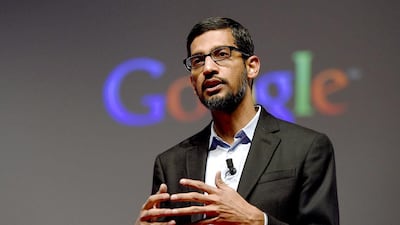His name may not ring a bell, but Google’s new chief executive Sundar Pichai has worked on some of the firm’s popular products – the Chrome browser to Android mobile software.
Mr Pichai, 43, was named chief executive of the internet front-runner late on Monday, in Google’s surprise announcement of a new corporate structure creating an umbrella company called Alphabet.
He will oversee the biggest company under that umbrella, which will still be called Google, and will continue to include some of its household products, including its search engine, adverts, maps, apps, YouTube and the Android system.
Alphabet will be run by Google chief and co-founder Larry Page, who showered praise upon Mr Pichai, senior vice president of products.
“I feel very fortunate to have someone as talented as he is to run the slightly slimmed down Google, and this frees up time for me to continue to scale our aspirations,” Mr Page said in a blog post.
The Google chief said he was impressed with Mr Pichai’s “progress and dedication to the company” and promised to continue to groom his long-time right-hand man, who has been at Google since 2004.
“I have been spending quite a bit of time with Sundar, helping him and the company in any way I can, and I will of course continue to do that.”
In his role as senior vice president (SVP) of products, Mr Pichai will oversee management, engineering and research for Google’s products and platforms, according to the regulatory filing with the US Securities and Exchange Commission in which Google declared its new structure.
In earlier roles, Mr Pichai was SVP of Google Android, Chrome and Apps, working on consumer products “used by millions of people”, the filing said.
Mr Pichai was part of the team that launched the Chrome browser in 2008 and also worked on various search products, including Google Toolbar, Desktop Search, Gadgets and Google Gears, according to the company.
In an interview with Forbes magazine last year, Mr Pichai said one of his main priorities was the transition to mobile.
“Is it an important shift for us?” he said. “Yes. Are we doing it well? There are many indications that, yes, we are. When you look at all our core products, they do well in mobile.”
He also talked about expanding Google Play into China, from which Google withdrew in 2010 after a fallout with Beijing over censorship issues.
“If we can figure out a model by which we can serve those users, it would be a privilege to do so. So, I don’t think of China as a black hole,” he told Forbes.
“I see it as a huge opportunity in which we are playing as an enabling platform today and, hopefully, we have a chance to offer other services in the future.”
A native of Chennai in South-eastIndia’s Tamil Nadu state, Mr Pichai received a Bachelor of Technology degree from the Indian Institute of Technology Kharagpur in 1993. He also has a Master of Science from Stanford University, California, and a Master of Business Administration from the Wharton School of the University of Pennsylvania.
Mr Pichai went on to work as an engineer at manufacturer Applied Materials, followed by a stint in management consulting at McKinsey & Company.
Mr Page said his right-hand man is the leader to steer the Google ship in the coming years, as it continues to innovate and expand its product base.
“Google itself is also making all sorts of new products, and I know Sundar will always be focused on innovation – continuing to stretch boundaries,” he said.
Under the reorganisation, Alphabet will oversee the company’s newer ventures, such as its research arm X Lab (currently working on driverless cars and internet balloons), its investment unit Google Ventures, its health and science operations (projects include a glucose-sensing contact lens), the drone delivery project Wing, Google Fiber’s high-speed internet, and the home automation unit Nest.
The Google co-founder Sergey Brin will be president of Alphabet. The Google executive chairman Eric Schmidt keeps his title at Alphabet.
The new operating structure “will be introduced in phases over the coming months”, according to Google, and will mean separate financial statements from the Google unit and its parent.
The reorganisation comes amid concerns that Google’s dominance of the tech sector may have peaked as the landscape evolves.
Google has for years been the leader in internet search and has turned advertising linked to those searches into a highly lucrative business.
But its shares have struggled since hitting an all-time high early last year, and it has little to show for ventures in other areas – self-driving cars, Google Glass, internet balloons, health care, Google TV, mobile payments, home automation and its Google+ social network, among others.
“This is a pretty assertive move on their part,” said Bob O’Donnell, who heads the consultancy TECHnalysis Research. “There have been a lot of questions about their ability to grow outside of search. Search has been their cash cow for a long time.”
The new structure means that each of the projects, including the more outlandish ones, would have to stand on their own and produce results, Mr O’Donnell said. “There has been a sense they need to be more serious about these things.”
Trip Chowdhry at Global Equities Research called the move “very positive” because it increases transparency for investors. Under the new structure, “you as an investor can now see clearly how the core business is performing, what kind of margins they are getting, and also keep an eye on what new innovations are happening”, Mr Chowdhry said.
Google shares rallied some six per cent in after-hours trading on news of the reshuffle to $672.
business@thenational.ae
Follow The National's Business section on Twitter

